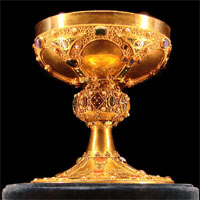 It’s interesting watching PCs (and their players) slip through a varying appreciation of cash. The same folks who will cheer at a 100 gp payout at 1st level will gradually become far more jaded towards their bank accounts as the levels tick past.
It’s interesting watching PCs (and their players) slip through a varying appreciation of cash. The same folks who will cheer at a 100 gp payout at 1st level will gradually become far more jaded towards their bank accounts as the levels tick past.
“I’ve only got 2,000 gp!”
Ah, yes. You poor dear. You’ve only got as much money as the average person makes in two lifetimes.
Of course, this might all be funnier if it didn’t happen in real life and with real money all the time.












World of Warcraft produces this effect very quickly, it’s a chance to experience becoming rich and how your perspective changes.
My D&D games don’t have copper, for the same reason I throw away pennies.
Only somewhat related, but in my game there continue to be interesting consequences of my change to award only 10% of normal experience for encounters, and allow players to sacrifice treasure on a 1-gp-for-1-xp basis.
First, as soon as they had enough cash, they fronted the party cleric money so he could reach 3rd level. This hasn’t backfired yet, although if he dies that’s going to be a fair amount of wealth down the drain.
Second, when the first PC died and was replaced, they gifted the replacement character with enough gold to reach level 2 immediately. (The party was at that time a mix of 2nd and 3rd level characters.) The group is 5 characters, so in effect every surviving PC paid 250 gp so they could have a more effective rogue in the party.
And third, we had a second death recently and we had our first experience with the reincarnate spell. Significantly cheaper than raise dead. In this case, a half-orc barbarian was reincarnated as an elf. Hmm, better get that armor taken in a bit.
I continue to like the effects of this change. I do have to be sure there’s more treasure available than normal (especially when deaths effectively take wealth out of the world forever), but it creates lots of interesting choices for the players, and it really seems to be mitigating against the “well, we’re past 2nd level, we should all have the optimal equipment at this point and now it’s just a question of increasing the enhancement bonuses” effect we saw in vanilla 3.x.
In all fairness to the “poor” adventurer with 2,000 bucks in the bank, the tools of his trade run a little on the expensive side.
To say nothing of his health insurance. 🙂
This is true. D&D’s healthcare system makes the American healthcare system look positively enlightened.
Depends – if the party’s cleric is of high enough level, only “death” is a really expensive malady. 😉
That’s why I keep wondering if a non-accounting system will ever be viable. It’s very tempting, but I’m wondering if “The Alexandrian” as ever attempted it? (Like the way he fixed Encumbrance).
I generally only use an “accounting” system if:
(a) Looting is a significant part of the game; and/or
(b) Trading is a significant part of the game
If that isn’t the case, I generally prefer an abstract wealth system. And I could hypothetically see an abstract wealth system working for a trading game, too, but the wealth mechanic would need to have a robust structure specifically designed to support the trade mechanics.
To expand on that:
I find that using abstract wealth mechanics for a typical “freelance hero / tomb raider” campaign is like playing a football game without keeping score. The primary motivation and default goal becomes very fuzzy and weak.
I’ve also never found an abstract wealth mechanic that combines well with a game where you’re making strategic decisions about equipment and/or other forms of investment. It’s like playing Monopoly without using money.
The default play mode for D&D uses both of these dynamics, so I’ve never found abstract wealth mechanics very satisfying. If you were using D&D to play a game of, say, court intrigue, on the other hand, you probably wouldn’t have much difficulty plugging in an abstract wealth mechanic. (D20 Modern has one, for example.)